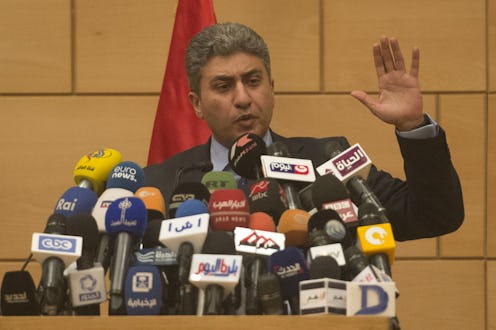News
Official Says The Crash "More Likely" Terrorism
Speculation began to run rampant about the cause of EgyptAir crash even before officials publicly confirmed that there had been a crash. Even as late as mid-afternoon Thursday, the Egyptian Civil Aviation Minister Sherif Fathi insisted on saying "missing plane" — despite confirmation from Greek officials and the French President Francois Hollande himself that flight MS804, which disappeared from radar at 2:37 a.m. local time, had in fact crashed. That didn't stop Fathi from hypothesizing about the cause of the crash though; he told the news conference that terrorism is "more likely" the cause of the EgyptAir crash than a mechanical failure.
Fathi did not want to make any assumptions, but a rambunctious crowd of journalists pressed him on the possible explanations for an Airbus 320 to fall out of the sky at cruising altitude — one of the safest portions of any flight. "I am not happy with people making assumptions, while we haven’t found the wreckage yet," he said. Despite the reluctance, he went on to explain what the facts point to. "If you [analyze] the situation properly the possibility of having a terror attack is higher than the possibility of having a technical [problem]," he told the journalists.
Fathi's press conference came after President Hollande's remarks to the media. He confirmed that the plane did crash after speaking with Egyptian President Abdel Fattah el-Sisi. "When we have the truth, we must draw all the conclusions, whether it is an accident or another hypothesis — which everybody has in mind, the terrorist hypothesis." He stressed, though, that "no hypothesis was being ruled out and none is being favored."
The Russian's, however, in a bit of irony, were quick to call it terrorism. The head of Russia's top domestic security agency, Alexander Bortnikov, said Thursday it was "in all likelihood it was a terror attack," calling for a joint action to track down those responsible. In November a Russian jet in Egypt was blown out of the sky over the Sinai Peninsula after it left the Red Sea resort city of Sharm El Sheikh. Russians were slow to acknowledge that crash was caused by terrorism.
The reason terrorism seems the most likely answer stems from the circumstances of the crash. Greek officials explained Thursday that the plane made sharp a 90-degree turn to the left, immediately followed by a 360 degree turn to the right. It then dropped about 20,000 feet before disappearing from radar. The plane had just entered Egyptian air space and all appeared fine until it didn't respond to calls from Greek air traffic controllers who were preparing to hand over the flight to their counterparts in Egypt.
If there were some mechanical failure — as opposed to terrorism — the pilot would have called in for help. Jean-Paul Troadec, former president of the French air accident investigation bureau, speculated on the cause of the crash for Europe 1. He said a technical failure is unlikely due to the lack of contact from the crew. "In this case, the crew did not react, which makes us think of a bomb," he told the channel. Some sort of missile, perhaps like the one that brought down the Malaysia Airlines flight over Ukraine could also be a possibility, he said.
More will become clear after debris is located and the black boxes are examined, but that could take time.
